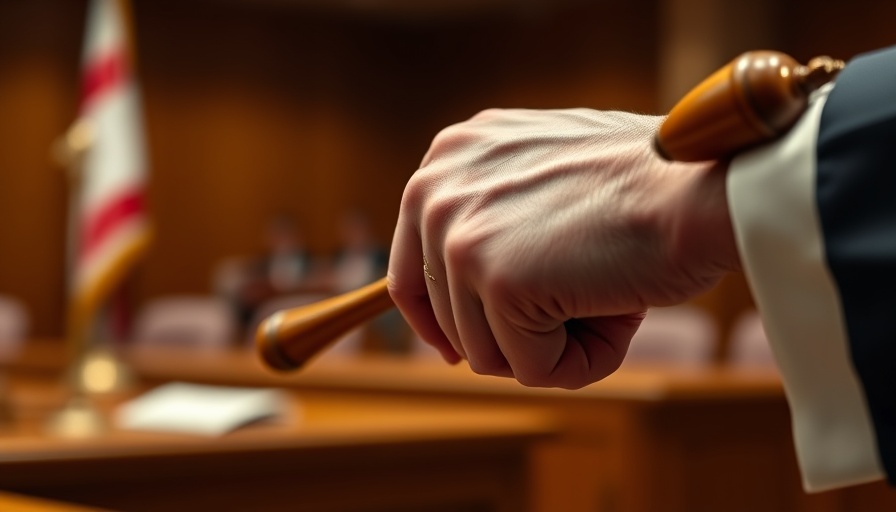
A Landmark Ruling: What It Means for AI Companies
The recent ruling by U.S. District Judge William Alsup marks a pivotal moment in the intersection of technology and copyright law. This case centers on AI startup Anthropic, which achieved a legal win permitting the training of its AI model, Claude, on copyrighted books. This judgment sets a precedent that potentially favors AI companies over individual creators in copyright disputes.
Judge Alsup's decision hinged on the principle of 'fair use.' He reasoned that Anthropic's approach was akin to a writer studying literature to become better in their craft. "Like any reader aspiring to be a writer, Anthropic's [AI]... was to turn a hard corner and create something different," Alsup articulated. This comparison emphasizes how the transformative nature of Claude's outputs is significant enough to merit this legal protection, crucial for AI companies operating in knowledge-centric fields.
Understanding Fair Use in the Age of AI
The fair use doctrine allows the limited use of copyrighted material without permission from the rights holders, contingent on the nature of the use and its impact on the market for the original work. The ruling likely implies that as long as AI-generated content can be shown to be distinct from its source material, companies may continue to develop innovative technologies without incurring legal repercussions.
However, caution remains essential. The ruling does not grant an overarching green light for AI companies to ignore copyright laws; a future trial will determine damages related to pirated books that Anthropic allegedly used. This aspect underscores a potential grey area where legal boundaries still exist.
Implications for Business Owners and Content Creators
This ruling carries weight for various stakeholders, particularly business owners considering AI implementation in their strategies. The potential for reduced legal risk around AI training could incentivize many businesses to leverage AI for innovation, permitting enhanced service offerings and efficiency without hefty legal concerns.
However, authors and content creators should remain vigilant. The discourse surrounding copyright and AI impacts the future of intellectual property rights. The balance between technological advancement and artistic integrity continues to shift, urging stakeholders to remain engaged in legal reforms and ethical dialogues.
Lessons from the Anthropic Case for Innovators
Innovative businesses can glean critical insights from the Anthropic case. First, it highlights the importance of understanding existing intellectual property frameworks as businesses integrate cutting-edge technologies. Innovators might consider adopting proactive legal strategies to align their operations with evolving laws, fostering resilience against potential copyright disputes.
This scenario also stresses the necessity for clear communication and collaboration among creators and technologists. Businesses that engage authors and content creators in the development of AI applications can build trust and mutual benefit, potentially calming concerns over copyright misuse.
The Future of AI and Copyright Law: Predictions and Insights
Looking forward, the Anthropic decision could herald a new era where AI companies feel emboldened to innovate across various sectors. Expect to see an increase in AI-driven tools that encourage transformative outcomes while navigating copyright laws more adeptly.
Nevertheless, the broader implications of this ruling could lead to heightened scrutiny regarding how AI companies source and utilize data. Future litigation is likely, as the ongoing conflict between innovation and intellectual property rights persists. Observers may anticipate a series of similar cases as the industry grapples with establishing clear guidelines to protect the interests of all parties involved.
With business growth intertwined with technological advances, navigating this rapidly changing landscape remains critical. Understanding the dynamics shaped by landmark rulings such as this one will empower business leaders to make informed decisions about integrating AI into their operations.
Conclusion: A Call to Action for Business Owners
The recent ruling points towards a transformative period for AI, but the path forward is complex. Business owners must remain alert to ongoing developments in copyright law as the legal landscape continues to evolve. Engaging in conversations about these issues can foster better practices and help mitigate risks.
It is essential for entrepreneurs to consider how they can harness the potential of AI while respecting the rights of creators. In doing so, they contribute to a balanced approach that encourages innovation and creativity in parallel. Stay informed, engage with legal experts, and participate in discussions around copyright updates to navigate this intricate domain effectively.
 Add Row
Add Row  Add
Add 



Write A Comment